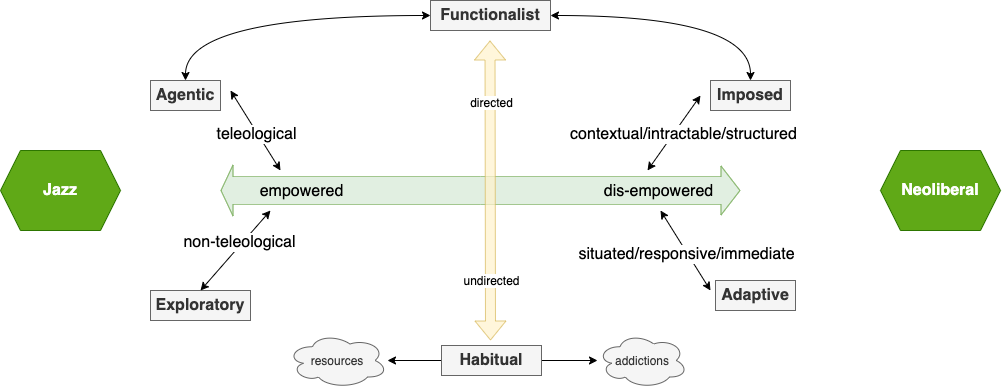Improvisation Taxonomy
Rather than common-sensical, it seems to me that considering improvisation as identical with contingency is actually counter-intuitive for many of the dominant deployments of that term. If improvisation is contingency itself, then it’s also nothing else per-se; in order to remain consistent as an idea, improvisation can’t be both contingent and necessarily any other quality, whether that has to do with freedom, spontaneity, or otherwise. Improvisation might in X circumstance involve or manifest any of those things, like freedom; but not necessarily or always.
Following this formulation, and considering that life itself is contingent, thinking about improvisation becomes less about a cultivated creative capacity and more about how we are in the world–how we respond to the situations that partially engender our agencies, our capacities, our perceptions. Improvisation in this sense is (as others have suggested) identical with experience itself.
If improvisation is another word for experience, then it might be useful to identify different genres of experience so as to guard against both over-generalizations and complete devolution of the concept. This won’t always be useful, but insofar as we want to consider a scene and identify what we mean by improvisation within that scene, coming up with a kind of taxonomy could help to specify the role of improvisation as we mean to identify it.
For example, agentic improvisation might be a process in which the an acting subject is empowered to express their subjectivity, or to use their improvisative capacity for the ends that they envision.
Adaptive improvisation might be the kind of scrambling that one performs in response to conditions that suddenly change or for which one is not prepared, for whatever reason. This is the famous “way out of no way”.
Imposed improvisation might name the consequences of those exploitative conditions that necessarily cause some people to have to flail while others can rely on steady and predictable supports. So gig workers piece together whatever they can, or hold office hours in improvised spaces, and self-medicate while the more steadily employed need not bother with this kind of improvisation; they know exactly where their paychecks and offices and healthcare always already are, a solidity that frees them up to improvise in other, more empowering ways.
Exploratory improvisation, also known as play, might describe the kind of activity we perform for its own sake, to probe the boundaries of something, even if that something is us.
Habitual improvisation might be the kind of repetitive activity that is undertaken in order to change our body’s capacities, as for instance when learning how to play an instrument, bake a cake, or come to feel at home in a new apartment. Habituation and attunement make us more familiar with something, increasing our knowledge, experience, and facility. Another possible name for this activity then would be “intimate improvisation”.
Neoliberal improvisation might be a way of identifying the ways in which selective definitions of improvisative activities are codified by capitalist industry, packaged into discrete units, and then sold (via workshops, books, discourses) to aspiring workers as performance techniques that employees are expected to input for the sake of increased output.
Functionalist improvisation similarly identifies whatever is required in order to move from point A to point B. It is goal-oriented and most often involves navigating indeterminacies in the sense of problem-solving (see previous post).
Finally (for now), jazz improvisation could be a word for the individual-in-collective musical exploration that is situated within the changing same of this particular, contested, expansive Black radical musical tradition, where “tradition” encompasses notions of genre, practice, discourse, debate, history, scene, and more. More broadly, a second definition might pick up or incorporate Fred Moten’s sentimental avant-grade, the aesthetic production-as (and not merely in response to)-diffusion of white supremacist patriarchy, or else what Anthony Reed calls (with perhaps a less explicitly ontological and more insistently historical register) the “fugitive voice” in Black sound (see In The Break and Soundworks, respectively).
Clearly these categories can overlap and/or involve shades of intensity (for example, the overlap between jazz and neoliberal improvisation is extensively documented by Dale Chapman). But it’s a mistake to conclude that one or the other stands for improvisation writ-large. What matters in my view is not these definitions per-se but the training they provide in asking follow-up questions whenever someone invokes the concept of improvisation, such as “for whom” and “with what consequences?”
Update: Scott Mclaughlin has visualized this taxonomy. Thanks Scott!
